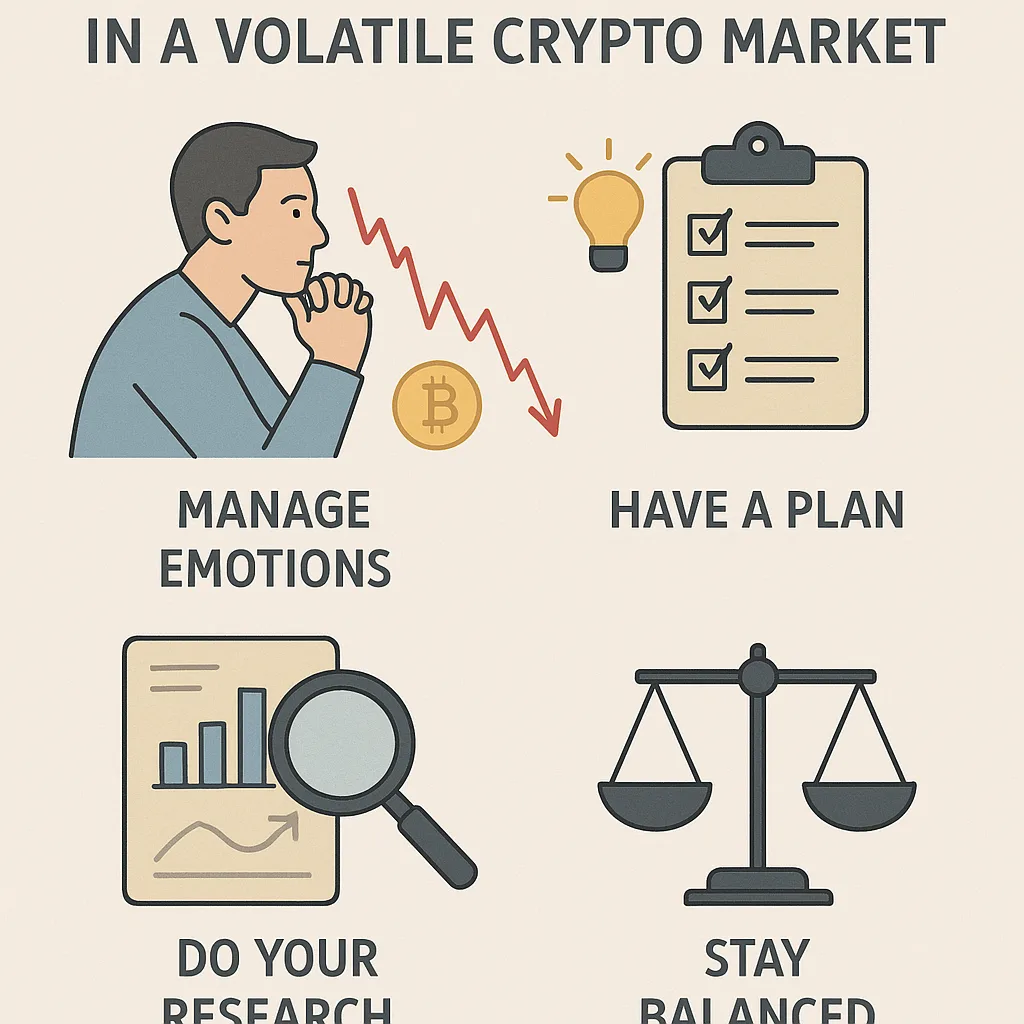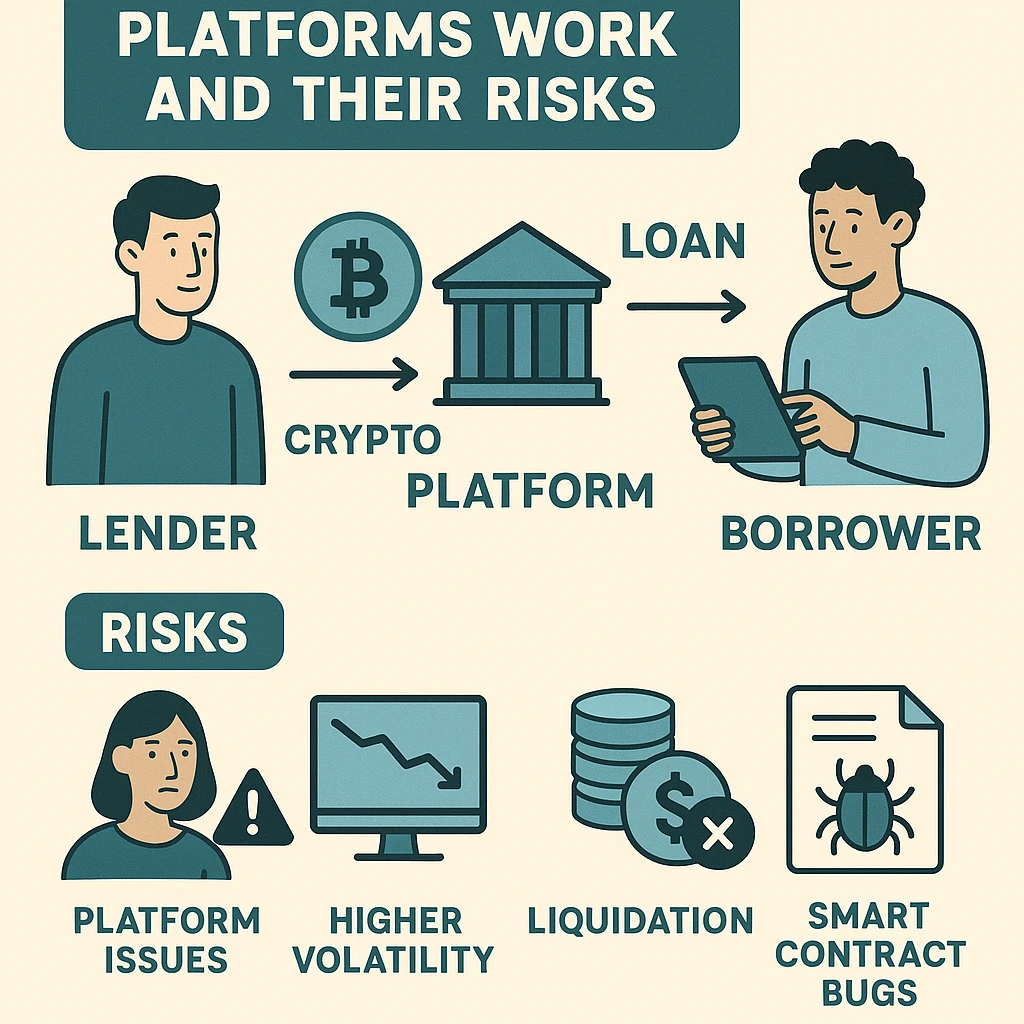One of the world's most volatile and dynamic financial markets is the cryptocurrency market. Although traders and investors have benefited greatly from this volatility, it has also led to panic selling, financial losses, and emotional decision-making. It's difficult to maintain composure in the cryptocurrency market when there are abrupt price drops and exuberant bull runs.
Long-term success, however, depends on your ability to control your emotions and use reason when the market is volatile, regardless of your level of experience as an investor or your level of curiosity as a novice.
In order to help you safeguard your money and your peace of mind in a volatile cryptocurrency market, we'll look at tactical, psychological, and strategic methods in this blog.
Why Is the Crypto Market So Volatile?
It's critical to comprehend why the cryptocurrency market is intrinsically more volatile than conventional financial systems before implementing any strategies:
1. Low Liquidity Compared to Traditional Markets
Compared to the global stock or bond markets, the total market capitalization of cryptocurrencies is still far lower. The price may be disproportionately affected by a large buy or sell order.
2. Speculative Nature
Many cryptocurrency assets are purchased with the expectation of future profits rather than for their inherent worth. Rapid price movements are fueled by this speculative mindset.
3. Lack of Regulation
Because cryptocurrency markets are less regulated than regulated financial markets, coordinated groups and whales can more easily manipulate prices.
4. 24/7 Trading
Crypto never sleeps, in contrast to stock markets. Increased price swings during periods with little trading activity may result from this always-on nature.
5. Media and Hype Cycles
Significant changes in sentiment and price can be brought about by tweets, news headlines, influencer opinions, and governmental regulations.
The Emotional Pitfalls of Crypto Investing
Volatility is a psychological minefield as well as a market condition. The following are typical emotional pitfalls that traders encounter:
1. Fear of Missing Out (FOMO)
Jumping into a coin because “everyone else is” can lead to buying at the top and regretting it later.
2. Fear, Uncertainty, Doubt (FUD)
Negative news often leads to panic selling, even when fundamentals haven’t changed.
3. Overconfidence
After a big win, traders may become reckless and overestimate their ability to “time the market.”
4. Loss Aversion
Investors are often more sensitive to losses than to gains, leading to irrational decisions like holding a tanking coin too long.
Strategy 1: Build a Solid Investment Thesis
One of the best ways to stay rational is to have a clear investment thesis before entering a position. Ask yourself:
-
Why am I investing in this asset?
-
What is the time horizon for this investment?
-
What would make me exit this position?
Whether it’s long-term belief in Ethereum, betting on a niche altcoin, or diversifying with stablecoins, having a plan helps remove emotion from the equation.
Strategy 2: Set Realistic Expectations
Don't anticipate 100x returns right away. Recognize that markets move in cycles and set goals that are both achievable and realistic. Steer clear of checking prices several times a day, as this can increase stress.
A rational investor knows:
-
There will be corrections, even in bull markets.
-
No project is immune to volatility.
-
Timing the top or bottom perfectly is rare.
Strategy 3: Use Risk Management Tools
Risk management is your emotional buffer during turbulent markets. Some best practices include:
1. Position Sizing
Never make larger investments than you can bear to lose. Generally speaking, you should risk 1% to 2% of your capital on each trade.
2. Stop-Loss and Take-Profit Orders
Use automated orders to lock in gains and limit losses. This reduces emotional decision-making during volatility.
3. Diversification
Spread your investments across multiple assets to reduce the impact of a single coin crashing.
4. Stablecoins for Safety
Holding USDT, USDC, or DAI during uncertain times allows you to maintain liquidity without exposure to price swings.
Strategy 4: Avoid Overtrading
Overtrading is often a response to anxiety, boredom, or greed. It leads to more fees, more mistakes, and more stress.
Instead:
-
Set a trading schedule (e.g., review weekly or biweekly).
-
Focus on quality trades, not quantity.
-
Use journal entries to document why you entered/exited trades.
Strategy 5: Practice Dollar-Cost Averaging (DCA)
DCA involves investing a fixed amount into an asset at regular intervals, regardless of price. This approach:
-
Removes emotional timing from investing
-
Lowers the average entry price over time
-
Encourages discipline and consistency
Example: Buy $100 of Bitcoin every Monday instead of waiting for a perfect entry point.
Strategy 6: Tune Out the Noise
The crypto space is full of hype, speculation, and misinformation. Be selective about what you listen to.
To stay rational:
-
Follow trusted sources and developers—not influencers with hidden agendas.
-
Avoid chasing pump-and-dump schemes.
-
Mute unnecessary notifications that trigger impulsive behavior.
Strategy 7: Zoom Out and Think Long Term
Short-term charts often show dramatic fluctuations. Zooming out to view weekly, monthly, or yearly trends offers better perspective.
A long-term view helps you:
-
Understand market cycles
-
Identify real trends vs. temporary noise
-
Maintain conviction in quality investments
Remember: Bitcoin has seen dozens of 30-80% crashes and still reached new all-time highs.
Strategy 8: Educate Yourself Constantly
Crypto is a rapidly changing space. Stay updated on:
-
Market fundamentals
-
Protocol upgrades
-
Tokenomics
-
Security practices
-
Regulatory shifts
Knowledge builds confidence, and confidence reduces emotional decision-making.
Resources to consider:
-
Messari
-
CoinGecko
-
DeFiLlama
-
YouTube channels like Finematics or Bankless
-
News aggregators like The Block or CoinDesk
Strategy 9: Lean Into Community (Selectively)
Getting involved in mature, considerate communities can offer sanity checks, support, and wisdom. Think about Discord groups, Reddit threads, or DAOs that are devoted to long-term planning and research, not just "when Lambo?"
Avoid echo chambers or toxic communities where shilling and fear dominate the conversation.
Strategy 10: Know When to Take a Break
If you’re feeling overwhelmed, step away. Your mental health is more important than catching the next trade.
Take a walk. Turn off the charts. Focus on real-world goals.
Crypto will still be there tomorrow.
Bonus Tips for Staying Rational
-
Meditation and mindfulness: Helps reduce impulsivity and stress.
-
Financial therapy: Useful for chronic fear, anxiety, or gambling behavior.
-
Simulation trading: Test strategies risk-free before deploying real funds.
-
Accountability partner: Trade with someone you trust to keep emotions in check.
Final Thoughts
It is a two-edged sword, volatility. Opportunities are created, but your emotional fortitude is also put to the test. You can survive the cryptocurrency storm without losing your mind (or your portfolio) if you keep yourself informed, create a clear plan, and adhere to tried-and-true tactics.
In a market where extremes rule, rationality is your best ally. And like blockchain, it works best when backed by data, consistency, and transparency rather than feelings.
Therefore, keep in mind that winning every trade is not the aim, regardless of whether you are riding a bull wave or holding through a dip. It's to gradually make better choices.




Leave a Reply